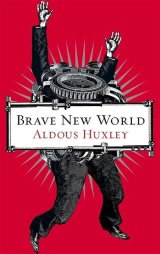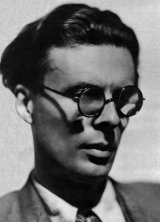Brave New World Page #8
Odd, original and irreverent, Aldous Huxley's tour de force is a darkly satiric vision of a "utopian" future --where humans are genetically bred and pharmaceutically anesthetized to passively serve a ruling order. A powerful and thought-provoking classic of speculative fiction, Brave New World is entertaining, fascinating, and terrifying all at the same time and remains remarkably relevant to this day as a warning to be heeded as we head into tomorrow.
"Hullo, Fanny," said Lenina to the young woman who had the pegs and locker next to hers. Fanny worked in the Bottling Room, and her surname was also Crowne. But as the two thousand million inhabitants of the plant had only ten thousand names between them, the coincidence was not particularly surprising. Lenina pulled at her zippers-downwards on the jacket, downwards with a double-handed gesture at the two that held trousers, downwards again to loosen her undergarment. Still wearing her shoes and stockings, she walked off towards the bathrooms. Home, home–a few small rooms, stiflingly over-inhabited by a man, by a periodically teeming woman, by a rabble of boys and girls of all ages. No air, no space; an understerilized prison; darkness, disease, and smells. (The Controller's evocation was so vivid that one of the boys, more sensitive than the rest, turned pale at the mere description and was on the point of being sick.) Lenina got out of the bath, toweled herself dry, took hold of a long flexible tube plugged into the wall, presented the nozzle to her breast, as though she meant to commit suicide, pressed down the trigger. A blast of warmed air dusted her with the finest talcum powder. Eight different scents and eau-de-Cologne were laid on in little taps over the wash-basin. She turned on the third from the left, dabbed herself with chypre and, carrying her shoes and stockings in her hand, went out to see if one of the vibro-vacuum machines were free. And home was as squalid psychically as physically. Psychically, it was a rabbit hole, a midden, hot with the frictions of tightly packed life, reeking with emotion. What suffocating intimacies, what dangerous, insane, obscene relationships between the members of the family group! Maniacally, the mother brooded over her children (her children) … brooded over them like a cat over its kittens; but a cat that could talk, a cat that could say, "My baby, my baby," over and over again. "My baby, and oh, oh, at my breast, the little hands, the hunger, and that unspeakable agonizing pleasure! Till at last my baby sleeps, my baby sleeps with a bubble of white milk at the corner of his mouth. My little baby sleeps …" "Yes," said Mustapha Mond, nodding his head, "you may well shudder." "Who are you going out with to-night?" Lenina asked, returning from the vibro-vac like a pearl illuminated from within, pinkly glowing. "Nobody." Lenina raised her eyebrows in astonishment. "I've been feeling rather out of sorts lately," Fanny explained. "Dr. Wells advised me to have a Pregnancy Substitute." "But, my dear, you're only nineteen. The first Pregnancy Substitute isn't compulsory till twenty-one." "I know, dear. But some people are better if they begin earlier. Dr. Wells told me that brunettes with wide pelvises, like me, ought to have their first Pregnancy Substitute at seventeen. So I'm really two years late, not two years early." She opened the door of her locker and pointed to the row of boxes and labelled phials on the upper shelf. "SYRUP OF CORPUS LUTEUM," Lenina read the names aloud. "OVARIN, GUARANTEED FRESH: NOT TO BE USED AFTER AUGUST 1ST, A.F. 632. MAMMARY GLAND EXTRACT: TO BE TAKEN THREE TIMES DAILY, BEFORE MEALS, WITH A LITTLE WATER. PLACENTIN: 5cc TO BE INJECTED INTRAVENALLY EVERY THIRD DAY … Ugh!" Lenina shuddered. "How I loathe intravenals, don't you?" "Yes. But when they do one good …" Fanny was a particularly sensible girl. Our Ford–or Our Freud, as, for some inscrutable reason, he chose to call himself whenever he spoke of psychological matters–Our Freud had been the first to reveal the appalling dangers of family life. The world was full of fathers–was therefore full of misery; full of mothers–therefore of every kind of perversion from sadism to chastity; full of brothers, sisters, uncles, aunts–full of madness and suicide. "And yet, among the savages of Samoa, in certain islands off the coast of New Guinea …" The tropical sunshine lay like warm honey on the naked bodies of children tumbling promiscuously among the hibiscus blossoms. Home was in any one of twenty palm-thatched houses. In the Trobriands conception was the work of ancestral ghosts; nobody had ever heard of a father. "Extremes," said the Controller, "meet. For the good reason that they were made to meet." "Dr. Wells says that a three months' Pregnancy Substitute now will make all the difference to my health for the next three or four years." "Well, I hope he's right," said Lenina. "But, Fanny, do you really mean to say that for the next three months you're not supposed to …" "Oh no, dear. Only for a week or two, that's all. I shall spend the evening at the Club playing Musical Bridge. I suppose you're going out?" Lenina nodded. "Who with?" "Henry Foster." "Again?" Fanny's kind, rather moon-like face took on an incongruous expression of pained and disapproving astonishment. "Do you mean to tell me you're still going out with Henry Foster?" Mothers and fathers, brothers and sisters. But there were also husbands, wives, lovers. There were also monogamy and romance. "Though you probably don't know what those are," said Mustapha Mond. They shook their heads. Family, monogamy, romance. Everywhere exclusiveness, a narrow channelling of impulse and energy. "But every one belongs to every one else," he concluded, citing the hypnopædic proverb. The students nodded, emphatically agreeing with a statement which upwards of sixty-two thousand repetitions in the dark had made them accept, not merely as true, but as axiomatic, self-evident, utterly indisputable. "But after all," Lenina was protesting, "it's only about four months now since I've been having Henry." "Only four months! I like that. And what's more," Fanny went on, pointing an accusing finger, "there's been nobody else except Henry all that time. Has there?" Lenina blushed scarlet; but her eyes, the tone of her voice remained defiant. "No, there hasn't been any one else," she answered almost truculently. "And I jolly well don't see why there should have been." "Oh, she jolly well doesn't see why there should have been," Fanny repeated, as though to an invisible listener behind Lenina's left shoulder. Then, with a sudden change of tone, "But seriously," she said, "I really do think you ought to be careful. It's such horribly bad form to go on and on like this with one man. At forty, or thirty-five, it wouldn't be so bad. But at your age, Lenina! No, it really won't do. And you know how strongly the D.H.C. objects to anything intense or long-drawn. Four months of Henry Foster, without having another man–why, he'd be furious if he knew …" "Think of water under pressure in a pipe." They thought of it. "I pierce it once," said the Controller. "What a jet!"
Translation
Translate and read this book in other languages:
Select another language:
- - Select -
- 简体中文 (Chinese - Simplified)
- 繁體中文 (Chinese - Traditional)
- Español (Spanish)
- Esperanto (Esperanto)
- 日本語 (Japanese)
- Português (Portuguese)
- Deutsch (German)
- العربية (Arabic)
- Français (French)
- Русский (Russian)
- ಕನ್ನಡ (Kannada)
- 한국어 (Korean)
- עברית (Hebrew)
- Gaeilge (Irish)
- Українська (Ukrainian)
- اردو (Urdu)
- Magyar (Hungarian)
- मानक हिन्दी (Hindi)
- Indonesia (Indonesian)
- Italiano (Italian)
- தமிழ் (Tamil)
- Türkçe (Turkish)
- తెలుగు (Telugu)
- ภาษาไทย (Thai)
- Tiếng Việt (Vietnamese)
- Čeština (Czech)
- Polski (Polish)
- Bahasa Indonesia (Indonesian)
- Românește (Romanian)
- Nederlands (Dutch)
- Ελληνικά (Greek)
- Latinum (Latin)
- Svenska (Swedish)
- Dansk (Danish)
- Suomi (Finnish)
- فارسی (Persian)
- ייִדיש (Yiddish)
- հայերեն (Armenian)
- Norsk (Norwegian)
- English (English)
Citation
Use the citation below to add this book to your bibliography:
Style:MLAChicagoAPA
"Brave New World Books." Literature.com. STANDS4 LLC, 2024. Web. 24 Nov. 2024. <https://www.literature.com/book/brave_new_world_2066>.




Discuss this Brave New World book with the community:
Report Comment
We're doing our best to make sure our content is useful, accurate and safe.
If by any chance you spot an inappropriate comment while navigating through our website please use this form to let us know, and we'll take care of it shortly.
Attachment
You need to be logged in to favorite.
Log In